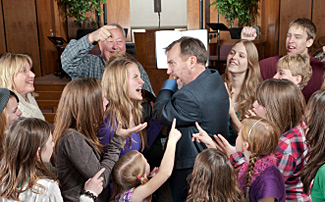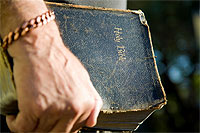I was twenty-five years old. My son, for whom my dad had worked so hard to live long enough to see, was born hurt and we weren't sure if he would be able to see in one eye or be brain damaged because of the birth injuries. I stood over the hole in the ground where my father's body was about to be placed, and I struggled for the ability to say the words I truly believed — words of faith and hope that seemed so out of place to my feelings.The words of Martha and Mary to Jesus, at the tomb of their brother Lazarus' tomb were very much what I felt in that moment: "Lord, if you had only been here, he wouldn't have died!"
(John 11:21-22; John 11:32).
"Lord, if only you had been here..."
There are times when all of us who follow Jesus long to have him come and be present with us. We want our Savior to be real and present and close. Whether it is a time of crisis, loneliness, loss, illness, or discouragement, we ache to have Jesus come to us. We long for him to wipe away our tears, bring his comforting presence, and have our faith become our sight!
I bet you've been there. You know I have. So, what would you think if I told you that Jesus longs to come and meet with us even more than we long for his presence to be real to us?
For several weeks, we will look at our yearning for Jesus' presence and Jesus' promises to come and be with us as Immanuel, God with us
(Matthew 1:23).
To see Jesus in our daily world, let's begin by going back to his and hearing a common greeting: "May you be covered in the dust of your Rabbi!"

This is an ancient Jewish blessing given to those chosen to be disciples of a rabbi. The principle is simple: Rabbis walked around and taught their disciples in the everyday coming and going of real life. They learned by being with their master, seeing what he did, hearing what he taught, answering questions he would ask, and being given authority to follow in his master's footsteps with authority given to him by his rabbi.
Jesus chose twelve apostles to be his closest students, his apprentices — to be the people who were covered with his dust because they walked so closely with him:
Afterward Jesus went up on a mountain and called out the ones he wanted to go with him. And they came to him. Then he appointed twelve of them and called them his apostles. They were to accompany him, and he would send them out to preach, giving them authority to cast out demons (Mark 3:13-15 NLT).
So how do we get covered with the dust of our Rabbi Jesus?
The answer for us is as clear and straightforward as it is neglected. We join Jesus in his daily ministry. We open one of the gospels — Matthew, Mark, Luke or John in our Bibles — and enter his world, and follow Jesus.
"I'm not good at reading the Bible."
"I'm sorry, but as much as I long to read the Bible, I find it confusing and boring. I feel guilty about it, but if I am honest, that is the way I feel."
"I want to do this. I'm usually good at it for a while, but then I find myself doing it less and less."
I've run into this so frequently when I can get people to be honest about their struggle in finding Jesus in his story in Scripture. But here is the point I want to make.
Reading the gospels is different than reading the Bible... at least in the way I want to challenge you to do it.
Matthew wrote his story of Jesus, his gospel, for us to meet Jesus. He alone calls Jesus, Immanuel, God with us
(Matthew 1:23). He wants us to enter the story, learn all Jesus taught by what he said and by what he did, and then "keep this life of Jesus alive" — the word obey means to literally "keep" — by living his way in our daily lives
(Matthew 28:20-21). Matthew wants Jesus to be God with us in our lives, too!
So how do we do that?
How do we meet a real Jesus in his story in the gospels?

How does it become more than just Bible reading?
Here are a couple things I have found helpful.
Don't read too much at one time: Read a little and let it settle into your soul and simmer in your heart. Read it in several versions. Read it slowly. Read it and ask Jesus to be real to you as you read it. Ask the Holy Spirit to speak to your heart in a way deeper than words. Seek to find in the reading what Jesus wants you to see about him — a word you need to notice for this time in your life, a teaching you need to memorize and put into practice, an action you need to see as something you need to do or know Jesus is beginning to do in your life.
See yourself as one of the characters in the story: Enter into the story as one of the people in the story. Do you want to know how Jesus feels about you? Do you want to know what Jesus would say to you in your situation? Do you want to know how Jesus would reach out to you? See how the Lord speaks, touches, reacts, affirms, ministers, forgives, reclaims, restores, and loves those in the story who wrestle with issues just like your own.
Open your imagination and put yourself in the story: Most of us have seen several of the Jesus movies and they can be very helpful, but your imagination — especially illuminated by the Holy Spirit when we invite the Spirit to help us
(1 Corinthians 2:9-16) — can help make the gospels real. What are the expressions on people's faces? What does it smell like in this story? What is Jesus looking at as he teaches this truth? What is the intonation of Jesus' words? How does Jesus look at the people to whom he ministers? What do their faces look like as he touches, teaches, heals, and blesses them? The gospels are written more in the Jewish style — the Joe Friday, "Just the facts, mam!" style. With the Lord's help, we get to enter into that moment and it becomes our moment.
Is it really OK to study the Bible this way?
Now some of you, at this point, are wondering if this is an acceptable way to do Bible study — or in our case, Jesus study so he is Immanuel to us. My response is multi-layered.
First, I have found it very helpful to me, and most preachers and teachers who have grabbed your heart with the Jesus story have done this for you as they share their message.
Second, others I have taught to do this have been profoundly blessed. It took them awhile, because most of us have been programmed to read a certain number of verses or chapters rather than settling into the story and letting it be something that is real, something into which we have entered. However, when you learn to do this, the Jesus story becomes much more real and rich to you.
Third, do this with younger children. They remind you to keep the story short. They have vivid imaginations. They will say things you don't expect. They will notice things you don't grasp. Plus, you will need to read simpler versions of the Bible and you will notice things that you have overlooked because you are out of your familiar territory in your Bible translation. They remind you to listen with wonder, excitement and anticipation. This works even better after you have read the story to them if you retell it in a way that keeps their attention and then have them retell it!
Fourth, this is very much along the tradition of Jewish celebrations of God's great events. The Passover was a time to not just remember, but relive what God had done — this was something God did for "us" and we share in it through the taste and smell of things that make the message real. The Lord's Supper is rooted in this same kind of reliving — a remembering involving more than our brain, but our taste buds, our sense of smell, and our doing it in community with others. Baptism is never called a symbol or step, but a sharing in the death, burial, and resurrection of Jesus where what the Lord did on the Cross, in the tomb, and on resurrection Sunday actually becomes real in us
(Romans 6:3-7). So what we are doing in our reading the story of Jesus is doing what Jesus and his apostles did with the Old Testament: they lived the story in the moment of reading it.
I have found if we will approach the gospel story of Jesus this way, suddenly we are in the crowd. Jesus' words are to us. Jesus' love is real and his presence is challenging or comforting or affirming or... whatever is most needed in the moment that we seek Jesus to not just be an ancient Savior, but our living and present Lord and Savior.

There's an old hymn that I remember singing as a child that still speaks to the longing of my heart. The song is titled, "Break Thou the Bread of Life" (by Mary Lathbury) and was almost always sung in connection with the Lord's Supper. Yet, the more I've heard it and listened to it and sung it, the more I have realized it is about my yearning for Jesus to be real... right now... in the moments of my life... when I need him... and when I need to be guided by him.
And for our seeking Immanuel in the story of the gospels, these few lines are powerfully true:
Beyond the sacred page, I seek Thee, Lord. My spirit pants for Thee, O Living Word.
Let's find Immanuel, God with us, in the story of Jesus in the gospels — not as Bible reading, but as Bible reliving and genuine holy experience.
About the Author

 Later in Paul's message to these same brothers and sisters in Christ, he spells out what this ultimate value looks like in daily life:
Later in Paul's message to these same brothers and sisters in Christ, he spells out what this ultimate value looks like in daily life: Paul's words about discipleship values are remarkably similar to what Jesus taught in the Sermon on the Mount
Paul's words about discipleship values are remarkably similar to what Jesus taught in the Sermon on the Mount Conflicts arise in our churches and coalitions form because we feel so strongly about what God wants us to do. Strong feelings are good, but they must be channeled through the principles Paul teaches in
Conflicts arise in our churches and coalitions form because we feel so strongly about what God wants us to do. Strong feelings are good, but they must be channeled through the principles Paul teaches in 

 A veteran preacher was teaching a class on Christian confidence and assurance. A class member became increasingly uncomfortable with what he thought was spiritual arrogance. He asked, "Are you saying that you know that if you die right now you'll go to Heaven? Isn't that terribly arrogant?"
A veteran preacher was teaching a class on Christian confidence and assurance. A class member became increasingly uncomfortable with what he thought was spiritual arrogance. He asked, "Are you saying that you know that if you die right now you'll go to Heaven? Isn't that terribly arrogant?" We are uncertain when we trust in ourselves and worry about our performance. When we trust in Him, we gratefully accept the fullness of redemption. Eugene Peterson has captured the essence of the Apostle Paul's message to Christians in Ephesus:
We are uncertain when we trust in ourselves and worry about our performance. When we trust in Him, we gratefully accept the fullness of redemption. Eugene Peterson has captured the essence of the Apostle Paul's message to Christians in Ephesus:

 This is an ancient Jewish blessing given to those chosen to be disciples of a rabbi. The principle is simple: Rabbis walked around and taught their disciples in the everyday coming and going of real life. They learned by being with their master, seeing what he did, hearing what he taught, answering questions he would ask, and being given authority to follow in his master's footsteps with authority given to him by his rabbi.
This is an ancient Jewish blessing given to those chosen to be disciples of a rabbi. The principle is simple: Rabbis walked around and taught their disciples in the everyday coming and going of real life. They learned by being with their master, seeing what he did, hearing what he taught, answering questions he would ask, and being given authority to follow in his master's footsteps with authority given to him by his rabbi. How does it become more than just Bible reading?
How does it become more than just Bible reading? There's an old hymn that I remember singing as a child that still speaks to the longing of my heart. The song is titled, "Break Thou the Bread of Life" (by Mary Lathbury) and was almost always sung in connection with the Lord's Supper. Yet, the more I've heard it and listened to it and sung it, the more I have realized it is about my yearning for Jesus to be real... right now... in the moments of my life... when I need him... and when I need to be guided by him.
There's an old hymn that I remember singing as a child that still speaks to the longing of my heart. The song is titled, "Break Thou the Bread of Life" (by Mary Lathbury) and was almost always sung in connection with the Lord's Supper. Yet, the more I've heard it and listened to it and sung it, the more I have realized it is about my yearning for Jesus to be real... right now... in the moments of my life... when I need him... and when I need to be guided by him.

